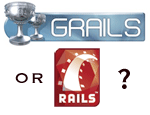 A couple of interesting things happened today that relate to my Grails vs. Rails quest for knowledge.
A couple of interesting things happened today that relate to my Grails vs. Rails quest for knowledge.
The first is that Grails 1.0 was released. This was apparently a huge event as it swamped Codehaus' servers for a couple hours. This morning, it was pretty cool to shake Graeme's hand and congratulate him on the release. I also got to meet Jeff Brown for the first time. Who needs to go to a conference when you get to talk to these guys at work? 
Secondly, I found an article by Ryan Shillington that shows how to deploy a Rails application to WebSphere. To me Rails + WebSphere seems like the last thing a Rails advocate would want - but who knows. In my experience, most developers that use WebSphere don't do it by choice.
For companies that have invested a lot of time and money into the JVM as a platform, it seems like Grails is the clear winner over Rails. However, the line gets blurry when you start talking about JRuby. I think JRuby will get there, but I don't believe it's there yet. If you look at the two major JRuby on Rails success stories (from Oracle and Sun), they've had to fix performance issues as part of their projects. With big companies investing in the platform, it's highly likely performance will be fixed in the near future. I believe both the Groovy and JRuby teams have said performance enhancements are their top priority for their next releases.
I think the biggest news related to performance of dynamic languages on the JVM is the new Da Vinci Machine project.
This project will prototype a number of extensions to the JVM, so that it can run non-Java languages efficiently, with a performance level comparable to that of Java itself.
Dynamic languages on the JVM seem to have a very bright future.
I got involved with Struts and Spring just before their 1.0 releases. Is it simply a coincidence that I happened to start looking into Grails right before its 1.0 release?
Here's some interesting snippets I found while reading blogs today:
- Stop writing plain old Java code. Groovy obsoletes plain old Java. We ought to just say "Java 7 = Groovy" and move on. -- Stuart Halloway
- So far my experience is that I love the Ruby language and don't want to go back to doing Java except when/if I need to to pay the bills. But Rails I'm not as sold on. Mind you I'm not here to bash on Rails, there are some great things there and other people have done a fine job of praising them. But there are some things I definitely miss from Tapestry, and the most significant one is components. -- MysteryCoder
- If you're looking for maximum control over presentation and the best possible appearance for the finished product, I would say Flex is probably the way to go. If you're a Java developer using Java on the server side, or you just can't stand the thought of having your app run in the Flash player and would prefer JavaScript, GWT is probably going to work out very well for you. Open Laszlo is going to offer a great deal of platform versatility, but at the expense of some polish and features available in the other two frameworks. - Kevin Whinnery in Three RIA Platforms Compared: Adobe Flex, Google Web Toolkit, and OpenLaszlo
- A new experimental feature of WebTest allows to specify the number of threads that should be used for the tests what can bring enormous speed improvements without modification of the tests. -- Marc Guillemot
To summarize: use Groovy over Java, Rails needs components, Flex is the best RIA framework and WebTest keeps getting better. These aren't my words, but I don't see much fault in them either.



 However, that's not always true either.
However, that's not always true either.
 A couple of interesting things happened today that relate to my
A couple of interesting things happened today that relate to my 
